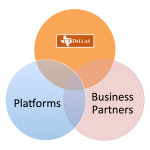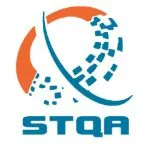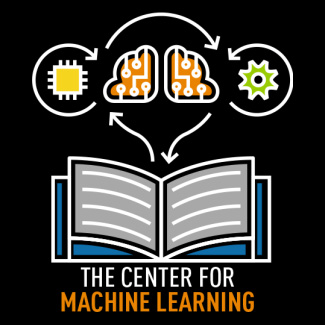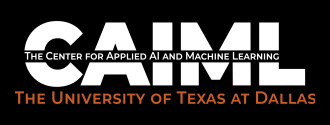Institutes and Centers
Cyber Security Research and Education Institute
CYBER SECURITY RESEARCH AND EDUCATION INSTITUTE

Director: Dr. Kevin Hamlen
Website
The Cyber Security Research and Education Institute is dedicated to conducting focused research and education that help prevent, detect and solve cybercrimes.
UT Dallas is an NSA/DHS National Center of Academic Excellence in Cyber Defense Education and Research as well as Cyber Operations.
For more detailed information about the Cyber Security Research and Education Institute (CSI), please click here.
Human Language Technology Research Institute
HUMAN LANGUAGE TECHNOLOGY RESEARCH INSTITUTE

Director: Dr. Sanda Harabagiu
Website
Human language technology incorporates a broad spectrum of disciplines working toward two closely related goals:
- Enabling computers to interact with humans using natural language capabilities
- Enabling computers to serve as useful assistants to humans by providing services such as automatic text understanding and retrieval, information extraction and question answering, automatic translation, and speech recognition
The institute includes six research centers: the Center for Basic Research in Natural Language Processing, the Center for Emerging Natural Language Applications, the Center for Machine Learning and Language Processing, the Center for Search Engines and Web Technologies, the Center for Text Mining, and the InterVoice Center for Conversational Technologies.
Institute for Data Analytics
INSTITUTE FOR DATA ANALYTICS

We operate a world-class organization in data analytics that serves the students and faculty of the University of Texas at Dallas as well as the external organizations that sponsor our work. Our goal is to provide extraordinary service to our clients, funded research opportunities for our faculty, and employment opportunities for our students.
Center for Software Testing
CENTER FOR SOFTWARE TESTING

Director: Dr. Eric Wong
Website
The center’s primary objective is to promote further research and develop advanced cutting-edge technologies, with user-friendly tool support, for technology transfer. We will focus on closing the gap between the state-of-art research conducted in an academic setting and the state-of-practice techniques used in the field. We will assist practitioners, no matter what their previous level of experience with software testing and quality assurance, to be quickly brought up to speed on the necessary background knowledge and gain the ability to apply a cost-effective set of procedures tailored to their specific projects.
Software Technologies to Improve (Human) Performance (h-STIP)
THE CENTER FOR SOFTWARE TECHNOLOGIES TO IMPROVE (HUMAN) PERFORMANCE (H-STIP)

Director: Dr. Ovidiu Daescu
The Center for Software Technologies to Improve (Human) Performance (h-STIP) focuses on autonomous transportation and delivery of goods and products, with a focus on shared autonomous vehicle transportation, order delivery and monitoring aerial space for drone navigation. Researchers assess human interaction and engagement through speech processing applications, driving analysis and modeling, emotion analysis, and dialog knowledge extraction. Applications include medical decision-making via artificial intelligence (AI) and machine learning.
Center for CS Education and Outreach
CENTER FOR CS EDUCATION AND OUTREACH

Director: Dr. Jey Veerasamy
Website
The Center for CS Education and Outreach’s mission is to introduce the magical world of Computer Programming in an enjoyable manner to every school student in the greater Dallas area and beyond.
Activities
Summer Camps, Workshops during School Breaks/Holidays, Weekend Clubs, Online Clubs, Programming Contests, Custom Workshops & campus tours for schools, custom camps/workshops off-site for schools/groups, weekly after-school clubs in nearby schools, Teaching Training workshops, Career day presentations, FREE workshops to the community on MLK day of service, hands-on workshops for UTD students and professional development workshops for adults.
People
Director: Dr. Jey Veerasamy, jeyv@utdallas.edu
Associate Director: Prof. John Cole, john.cole@utdallas.edu
and an army of UT Dallas students!
Contact
Email (preferred): csk12@utdallas.edu (information, clarifications, cancellation requests, etc.)
Phone: 214-924-2148
The Dallas Institute for Interactive and Spatial Computing (UT-DIISC)
THE DALLAS INSTITUTE FOR INTERACTIVE AND SPATIAL COMPUTING (UT-DIISC)
Director: Dr. B. Prabhakaran
Website
The goal of the University of Texas Dallas Institute for Interactive and Spatial Computing is to incorporate activities in a broad spectrum of disciplines such as computational geometry, computer graphics, high-dimensional data analysis, human-computer interaction, information visualization, multimedia, and virtual reality. These activities enhance knowledge and human performance through bioinformatics, physically-based modeling and simulation, and training and education applications.
The Center for Machine Learning
THE CENTER FOR MACHINE LEARNING

Director: Dr. Sriraam Natarajan
The Center for Machine Learning is housed in the Department of Computer Science within the Erik Jonsson School of Engineering and Computer Science at the University of Texas at Dallas. The Center’s mission is to foster excellent research and development of machine learning algorithms motivated by challenges from real work domains ranging from precision health to natural language understanding, from biology to social network analysis and from vision to mobile health. The center’s core team consists of researchers whose expertise lies in relational models, probabilistic modeling, combinatorial optimization, active learning, logic-based learning, human-in-the-loop learning, reinforcement learning, supervised learning and data mining. The research emphasis of the center implies it is synergistic with the Human Language Technology Research Institute and the Cyber Security Research and Education Institute. Furthermore, the center will promote outreach and educational activities in machine learning and AI, such as a summer school for students from other universities who are interested in this area.
The Center for Applied AI and Machine Learning
THE CENTER FOR APPLIED AI AND MACHINE LEARNING

Director: Dr. Doug DeGroot
The Center for Applied Artificial Intelligence and Machine Learning (CAIML) is housed in the Department of Computer Science within the Erik Jonsson School of Engineering and Computer Science at the University of Texas at Dallas. The center’s mission is to create a center of excellence skilled in applying leading-edge AI & ML technologies and solutions for our partners’ strategic products and services. The objective of the Center for Applied AI and Machine Learning is to develop long-term, ongoing joint activities through research and development partnerships with companies and organizations in the Dallas Fort Worth Metroplex area and Texas. CAIML’s aim is to focus on applied R&D rather than on basic research with the intent of being integral rather than ancillary wherever possible.
Global Counterterrorism and Threat Intelligence Research Institute
Global Counterterrorism and Threat Intelligence Research Institute

Director: : Dr. Latifur Khan
The Global Counterterrorism and Threat Intelligence Institute is a collaborative effort of the Erik Jonsson School of Engineering and Computer Science and the School of Economic, Political and Policy Sciences and housed in the Department of Computer Science at the University of Texas at Dallas. The Institute’s mission is to conduct research leading to technologies that enhance the safety of Texas, the U.S. and the global community from actors involved in transnational crime and human trafficking, through actionable solutions and strategic partnerships. The Institute’s core team consists of researchers with expertise in cybersecurity, data science and operational intelligence and serves as a bridge between academia, government and industry, ensuring that research-driven insights translate into real-world impact. The Institute will promote outreach and educational activities, including practical experiences in research and policy analysis, while helping prepare the next generation of experts in cybersecurity and intelligence.




